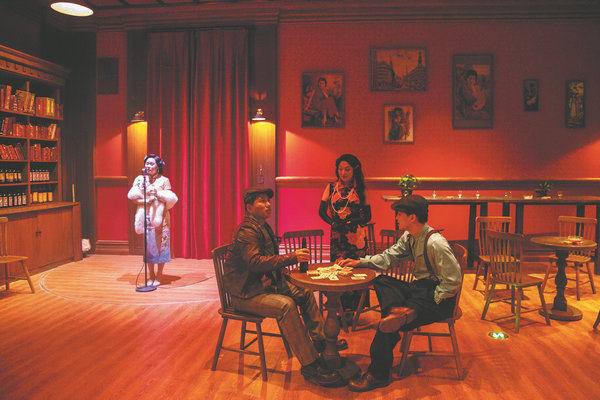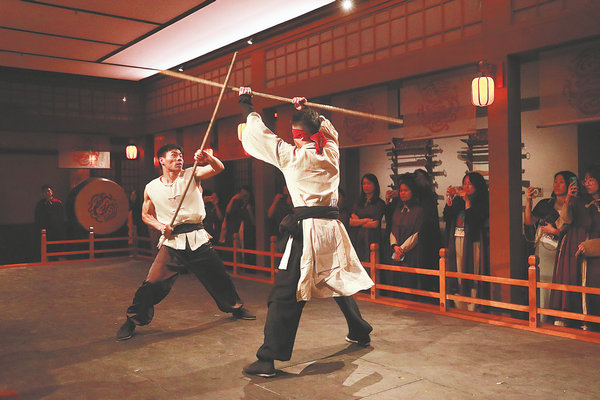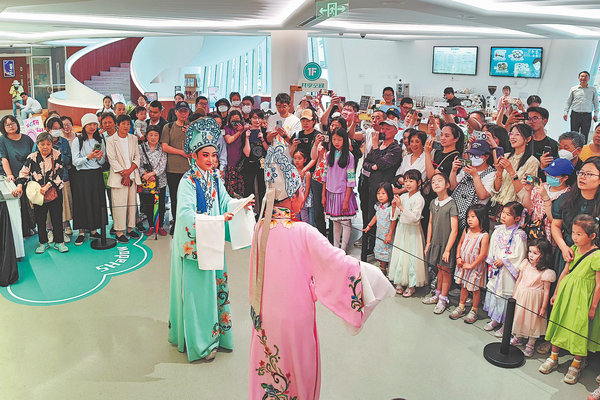 Actors perform at SAGA City of Light, featuring stories of 1930s Shanghai and time-travel experiences, in an immersive theater with a large performance area, by French production company Puy du Fou, in Xuhui district, Shanghai. [Photo provided to China Daily]
Actors perform at SAGA City of Light, featuring stories of 1930s Shanghai and time-travel experiences, in an immersive theater with a large performance area, by French production company Puy du Fou, in Xuhui district, Shanghai. [Photo provided to China Daily]
Wang Jiaqi and Zhang Yuyan may come from diverse backgrounds but they have one thing in common: their absolute love and passion for theater which leads them to binge-watch plays.
Two months ago, Wang, 21, a college student, traveled to Shanghai to watch four plays over a weekend. Such a tight schedule has been routine for her, and it is also becoming increasingly common in the lives of many theater lovers.
Her schedule is almost military in its precision. Wang, a clinical medicine student from Xiamen University, Fujian province, usually takes an overnight high-speed train to Shanghai on Friday evening, arrives at a youth hostel near People’s Square on Saturday morning, watches one play in the afternoon and another in the evening, and repeats the feat on Sunday. On Monday, she takes an early flight back to Xiamen.
As she often travels to Shanghai, by air or by railway, she says that she “could even walk from Shanghai Hongqiao Railway Station to People’s Square with my eyes closed”.
The area around Shanghai’s People’s Square is home to more than 70 theaters, including theater spaces in such well-known venues as the Asia Building, Shanghai Dashijie (the Great World), and Shanghai Cultural Square.
She doesn’t just watch the plays. After each performance, she always waits at the stage door, where actors enter and exit the theater, to interact with the professionals.
To cut costs, she sometimes sleeps on a seat at the Haidilao hotpot restaurant on Sunday nights, which is open all night, to wait for her flight. “The waiters at the restaurant all know me well now, and sometimes they even take me to a dimly lit area in the eatery, so I can rest more comfortably,” she adds.
Wang is one of many theatergoers crowding the theaters around People’s Square during weekends or short holidays. “Watch as much as you can” has become the motto for these theater lovers while in Shanghai.
Zhang, 22, is another theater enthusiast. After graduating from a Beijing university this summer and moving back to her hometown of Changzhou in Jiangsu province, she found that the short one-hour train ride from her city to Shanghai has made her play-watching binge more affordable.
In less than six months after settling down in her hometown, she had made seven trips to Shanghai for her “theater binge”. Actually before graduation, her play-watching schedule was even busier.
 Fans view a show at the immersive theater. [Photo provided to China Daily]
Fans view a show at the immersive theater. [Photo provided to China Daily]
Once, on a Friday night, she saw a musical in Beijing, while that Saturday morning she woke up at 5 o’clock to catch an early flight to Shanghai to watch two shows — Meng Weizhi, telling the story of two Chinese ancient poets, and Le Comte de Monte-Cristo, an adaptation by French playwright Alexandre Dumas’ well-known novel. That Sunday, she watched two more plays, and was about to fly home, but she got a message informing that her flight was delayed until midnight, so she immediately went to buy another ticket to watch another performance of the Le Comte de Monte-Cristo that evening, before winding up her record-breaking five-play binge.
“That was really exhausting, but it is my spiritual nourishment,” she says, recalling her “five-show-in-a-row craziness”.
Shanghai has become a favorite destination for many Chinese theatergoers. In 2017, the metropolis officially declared its target to become “Asia’s performing arts capital”. In 2019, its municipal bureau of culture and tourism proposed to set up 100 “new spaces for performances”. By transforming office buildings, shopping malls and commercial zones into accommodating performance venues, the city has broadened its theater landscape, helping “small-theater “low-budget plays to have more shows performed on more stages, thus gaining widespread popularity.
In terms of the number of musical performances, for example, Shanghai takes the lead nationally. Of all the 9,960 musical theater performances nationwide in 2023,5,888 were held in Shanghai, making up around 60 percent of the total. And in the first half of 2024, its 100 “new performance spaces” hosted 9,927 performances, attracting 1.68 million audience members and generating a total revenue of 147 million yuan ($20.3 million), according to the Shanghai Performing Arts Association.
Many “theater-bingers” repeatedly watch plays they have seen before.
Zhang once flew to Shanghai to see three performances of the musical Fan Letter, just to savor the different cast. A special term has been coined for this behavior: “collecting casts”.
It is even more common in small theaters, where performances are repeated every weekend with varying casts. For example, Mia Famiglia, a popular small-theater play staged since 2020 — telling stories of three men who meet in a 1930s New York bar and prepare for a final performance together — has been staged over 1,000 times in the past four years. It was scheduled to be staged for 17 performances in Shanghai this month, almost each time acted by a different cast, according to Damai, a ticketing service platform.
Wang is a loyal fan of the musical King’s Table, which features a man’s adventure on an island. “It is a tragedy of an idealist, but it converted into a belief for me: to do it anyway, even when it seems impossible,” she remarks.
 Visitors gather at the lobby of the Wanping Theater in Xuhui district, watching excerpts staged by Chinese traditional opera performers. [Photo provided to China Daily]
Visitors gather at the lobby of the Wanping Theater in Xuhui district, watching excerpts staged by Chinese traditional opera performers. [Photo provided to China Daily]
Wang watched the musical almost every time she visited Shanghai. Once, when she couldn’t get a ticket, she even chose to stay by the theater door, just to listen to the play. Touched by her passion, a staff member opened the door slightly so she could hear more clearly.
Another “crazy” thing she did was that she admired one of the lead actors, Guo Hongxu (as Jon Olsen in the musical), so much that she wrote a 6,000-word essay with a friend, just to comb through and praise his acting skills. After a show, the ardent fan waited at the stage door to meet Guo and hand him the essay as a gift to show her appreciation for both the actor and the play.
These enthusiasts meet in theaters and outside, fostering friendships before and after the shows. For example, Wang once realized that the person sitting next to her during a performance was an internet acquaintance. She offered to share a blanket with Wang when the theater turned cold due to air conditioning, and they became friends afterward.
Xu Zihan, 21, a junior from Zhejiang Normal University who’s also a theatergoer, has been to Shanghai 16 times this year to binge-watch plays. Also to save money, she often dines at an inexpensive Japanese eatery near the Asia Building after a show. “It’s such a happy moment, as it is packed with theatergoers, and we talk about the performance while eating,” Xu says.
Another way of cost saving is to find a mate with the same hobby to share a hotel room with, often in cheap youth hostels. “I have countless group chats for room-sharing in my phone, and through these, I’ve made many new friends,” she says.
Wang loves a quote from Xu Junshuo, 27, a well-known musical actor. He says: “Audiences may see the light onstage as stars while actors on the lit stage see the audience as a whole, dark sky. The light in the theater is not one-way — within the space, it lights up us all.”
For Wang, theater bingeing allows her to stray beyond her often boring routine, giving her quality time to let her imagination and fantasies run wild, and help her regain fresh energy while going back to real life.
“The charm of theater is endless. Every time I see tickets of future plays, I see it as a promise to meet friends again, inside and outside the theaters,” Wang says.
,https://english.shanghai.gov.cn/en-CulturalPerformances/20241118/2431da72129a4d688f67056c92a1abab.html
